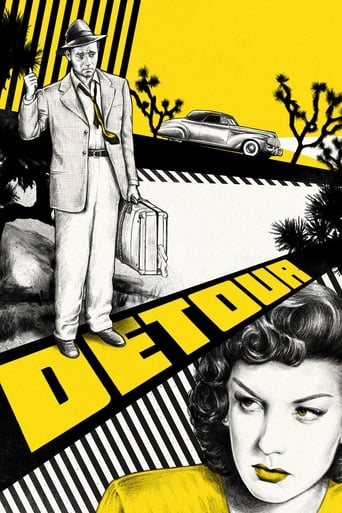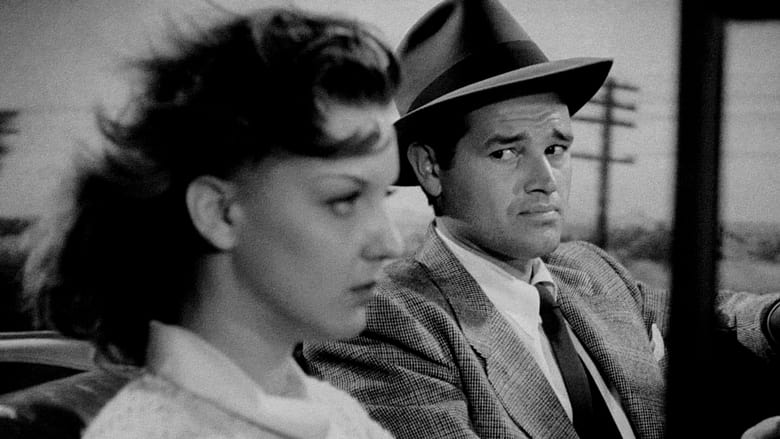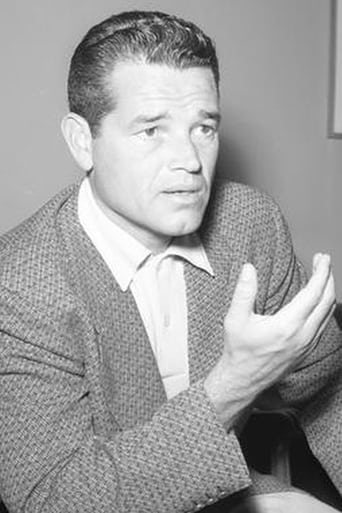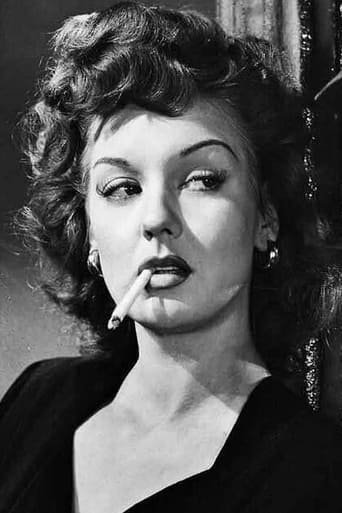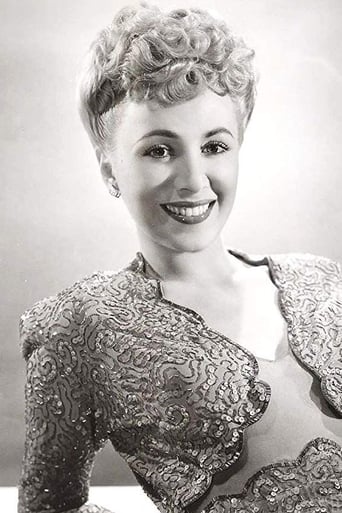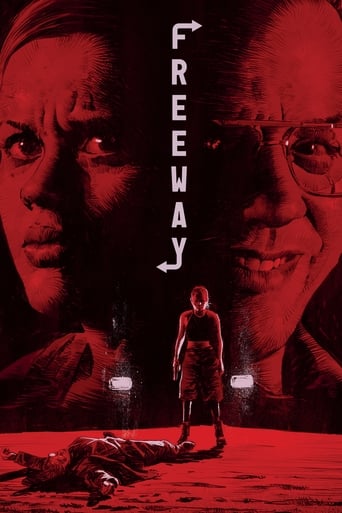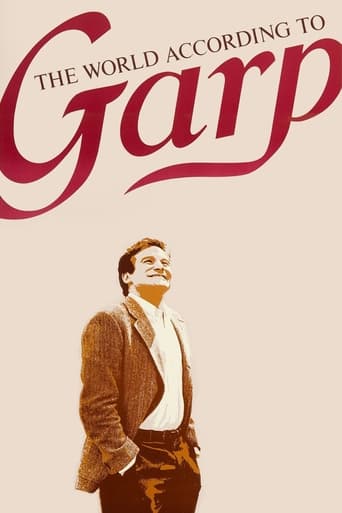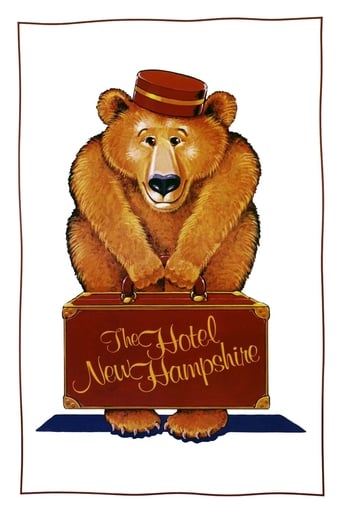Detour (1945)
The life of Al Roberts, a pianist in a New York nightclub, turns into a nightmare when he decides to hitchhike to Los Angeles to visit his girlfriend.
Watch Trailer
Cast


Similar titles
Reviews
i must have seen a different film!!
Fresh and Exciting
At first rather annoying in its heavy emphasis on reenactments, this movie ultimately proves fascinating, simply because the complicated, highly dramatic tale it tells still almost defies belief.
I think this is a new genre that they're all sort of working their way through it and haven't got all the kinks worked out yet but it's a genre that works for me.
Classic film noir with Tom Neal and a magnificent performance of Ann Savage, truly in Bette Davis style. Her gritty, mean, fast-talking persona leads to her eventual downfall.Talk about fate, circumstances and being in the wrong place at the wrong time. You've got Tom Neal in that kind of situation, for while hitch-hiking across America, he is picked up by a gambler who dies suddenly in the car. The Neal character, fearing that he will be named as the killer, dumps the body and travels on, only to meet Vera, played memorably by Miss Savage. From the beginning of their meeting, she dominates, calls the shots and Neal learns that she knew the guy that died.One problem I did have with the film was that to me it ended abruptly.
Down and out Al Roberts (Tom Neal) recalls his life as a New York nightclub piano player. His singer girlfriend Sue Harvey (Claudia Drake) rejects his proposal and seeks fame in Hollywood. He follows her west but with no money, he is forced to hitchhike. He catches a ride in the desert from degenerate gambler Charles Haskell Jr. (Edmund MacDonald) on his way to L.A. Haskell dies and Roberts fears being blamed for a killing. He hides the body and takes his identity. Along the way, he picks up hitchhiker Vera (Ann Savage) who happens to have ridden with Haskell before. Soon, she has him wrapped around her finger.Ann Savage has a fitting name. She savages the wannabe player. She's a real man eater. This is a small budget film. It can be strip down and thread bare. Its core is a B-movie noir. It's pulpy melodrama. It's not always the most technically sound but Savage rocks and it's usually a compelling watch.
Edgar G. Ulmer's classic 1945 film noir "Detour" gives new meaning to the derisive phrase "Don't do me any favors." Anybody who does somebody a favor ends up paying for it. Fate proves worse than blind justice in this minimalist masterpiece. No matter what our unfortunate protagonist does in this trim 71-minute, black & white melodrama, he gets kicked in the teeth. Typically, film noir movies focus on men who find themselves on the wrong side of the 8-ball. Usually, a dastardly dame is on the other side and she lures them to their demise. The hero here is a destitute piano player who doesn't pack a firearm. Basically, he is an honest guy whose streak of bad luck earns him an inevitable seat in the gas chamber. Although we never witness his ultimate fate, the implication is rather obvious by the end of this taut tale. Like the standard film noir, "Detour" occurs primarily in flashback as our protagonist reflects on his disreputable past. The poverty row studio Producers Releasing Corporation made this melodrama, but the low budget doesn't constitute a liability. Instead, the austerity of everything enhances this cynical, unsavory, doom-laden subject matter. The performances all qualify as solid stuff, though none of the thespians left a cinematic legacy. Tom Neal is convincing but sympathetic as the conscientious protagonist who finds himself trapped in a web of circumstances. In real life, Neal was a scrapper. Later, he did time in prison for shooting his wife. Nevertheless, he is thoroughly credible as the ill-fated hero plagued by bad luck. Neal made some notable films, including "The Flying Tigers" with John Wayne and "The Bowery at Midnight" with Bela Lugosi. Neal's leading lady Ann Savage didn't murder anybody in real life, but she languished for most of her career in low-budget movies, most prominently "Renegade Girl" (1946). Aside from these two, the remaining nine actors and actresses made little impression. Meantime, acclaimed cult director Edgar G. Ulmer skillfully fashioned a memorable yarn on a threadbare budget, but he shared credit with Anthony Quinn's brother-in-law Martin Goldsmith. Nominated later for an Oscar for his contribution to "The Narrow Margin," Goldsmith penned this gripping narrative. Moreover, he contributed some sharp, snappy dialogue that Neal and Savage uttered with glorious irony more often than not. Their scenes in a Los Angeles apartment are unforgettable for their vitriolic repartee.Al Roberts (Tom Neal) plays piano in a seedy nightclub, while his attractive girlfriend, Sue Harvey (Claudia Drake of "Reunion in France"), warbles songs. Sue sings the song "I Can't Believe You Fell in Love with Me," and this song later haunts the forlorn protagonist. Sue wants to wed Al, but she prefers to make her fortune first before she ties the matrimonial knot. Sue surprises Al when she reveals her plans to head to Hollywood to seek fame and fortune. Ironically, when she arrives in Tinsel Town, Sue winds up slinging hash. Al perseveres around New York City, until he can no longer live without his songbird. He takes the ankle express to Hollywood, thumbing rides when he isn't wearing out shoe leather. Along the way, a motorist in a convertible, Charles Haskell Jr (Edmund MacDonald of "Destry Rides Again"), picks up Al in Arizona and agrees to drive him to their mutual destination Los Angeles. During the journey, Charles talks about his dueling scar. Al notices three scratches on Haskell's hand, and Haskell talks about an obstinate woman that he picked up and then turned loose. Al slips behind the steering wheel, while Haskell takes a nap. They are caught in a downpour with the roof down. When he tries to get Haskell out of the car, the man falls out and dies. Al suspects that nobody will believe that Haskell died in such a convenient manner. Instead of surrendering himself to the authorities, Al drags Haskell's corpse out into the desert, and he appropriates dead man's identity. The cash-strapped musician is pleased when he discovers a wad of dough. This good fortune doesn't last long because he picks up a hitchhiker, and she turns out to be Vera (Ann Savage) the same girl who scratched up Haskell. Vera threatens to turn Al over to the authorities, but she never makes good on her threat. Once they arrive in Los Angeles, they set out to sell their car. Neither Tom nor Vera utter kind words for the other. Eventually, she seizes the telephone and locks herself away in her room and threatens to call her cops. Al grabs the telephone cord and pulls on it. Little does he realize what he has done until he breaks into the bedroom and finds the cord wrapped tightly around Vera's neck. Talk about rotten luck. Al flees from the apartment complex, but the Highway Patrol nabs him. Things do not appear to be auspicious for Al."Detour" ranks as top-notch film noir. You cannot help but feel sorry for the woebegone protagonist. At the same time, Al Roberts emerges as a petulant loser, and it's easy to see why Sue would leave him behind. If you consider yourself a film noir completist, you have to have seen this gem.
As I mentioned to my brother that I had watched this film he informed me that it basically had no budget. This made a great deal of sense to me since I did not see much production value in it - this was noticeable even with it being an older film. To me Detour seems like a very rushed attempt at trying to make a noir film that works - not necessarily a great noir film, but one that fits the tenants of the genre. We start with Al Roberts as the wanderer who chooses not to be sociable; there is something troubling him, and he conveys this through, what seems to me to be, over-acting. We get a shift in chronology (a tenant of film noir which I love) and flash back to when he was a pianist and happy with a girlfriend, and this is where his journey begins. He needs to travel west to be with his beloved, but he needs to hitchhike in order to do so. Roberts meets a man named Haskell and the titular detour to where Roberts needs to go occurs on this journey. He inconveniently ends up in a situation where Haskell dies from what seems to be an accidental hit on his head as he falls out of the car. Then, because plot, Roberts happens to unknowingly stumble across Haskell's wife at a gas station, and he allows her to ride with him. As a complicated love triangle is almost formed, Haskell's wife blackmails Roberts into helping her squeeze money out of Haskell's car and inheritance by threatening to bring her husband's murder to the police. Once again, because plot, Roberts accidentally (yes it was an accident with a phone line) strangles Vera and kills her. He becomes the typical unreliable noir narrator at this point since this could have likely gone another way. All of this was rushed in just over the span of an hour. It is a noir film that has a cohesive plot, but evoked little interest from me. The ending voice-over about his acceptance of getting picked up one day over the image of him actually getting picked up by authorities was intriguing, but not the sort of ending which would rank this film among the likes of Sunset Boulevard or Double Indemnity.

